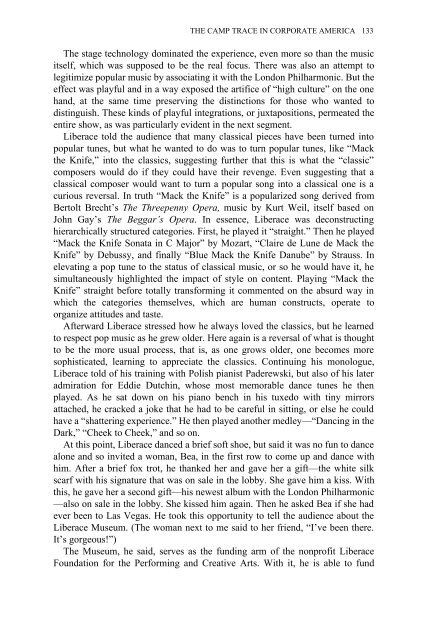Edited by Moe Meyer - Get a Free Blog
Edited by Moe Meyer - Get a Free Blog
Edited by Moe Meyer - Get a Free Blog
You also want an ePaper? Increase the reach of your titles
YUMPU automatically turns print PDFs into web optimized ePapers that Google loves.
THE CAMP TRACE IN CORPORATE AMERICA 133<br />
The stage technology dominated the experience, even more so than the music<br />
itself, which was supposed to be the real focus. There was also an attempt to<br />
legitimize popular music <strong>by</strong> associating it with the London Philharmonic. But the<br />
effect was playful and in a way exposed the artifice of “high culture” on the one<br />
hand, at the same time preserving the distinctions for those who wanted to<br />
distinguish. These kinds of playful integrations, or juxtapositions, permeated the<br />
entire show, as was particularly evident in the next segment.<br />
Liberace told the audience that many classical pieces have been turned into<br />
popular tunes, but what he wanted to do was to turn popular tunes, like “Mack<br />
the Knife,” into the classics, suggesting further that this is what the “classic”<br />
composers would do if they could have their revenge. Even suggesting that a<br />
classical composer would want to turn a popular song into a classical one is a<br />
curious reversal. In truth “Mack the Knife” is a popularized song derived from<br />
Bertolt Brecht’s The Threepenny Opera, music <strong>by</strong> Kurt Weil, itself based on<br />
John Gay’s The Beggar’s Opera. In essence, Liberace was deconstructing<br />
hierarchically structured categories. First, he played it “straight.” Then he played<br />
“Mack the Knife Sonata in C Major” <strong>by</strong> Mozart, “Claire de Lune de Mack the<br />
Knife” <strong>by</strong> Debussy, and finally “Blue Mack the Knife Danube” <strong>by</strong> Strauss. In<br />
elevating a pop tune to the status of classical music, or so he would have it, he<br />
simultaneously highlighted the impact of style on content. Playing “Mack the<br />
Knife” straight before totally transforming it commented on the absurd way in<br />
which the categories themselves, which are human constructs, operate to<br />
organize attitudes and taste.<br />
Afterward Liberace stressed how he always loved the classics, but he learned<br />
to respect pop music as he grew older. Here again is a reversal of what is thought<br />
to be the more usual process, that is, as one grows older, one becomes more<br />
sophisticated, learning to appreciate the classics. Continuing his monologue,<br />
Liberace told of his training with Polish pianist Paderewski, but also of his later<br />
admiration for Eddie Dutchin, whose most memorable dance tunes he then<br />
played. As he sat down on his piano bench in his tuxedo with tiny mirrors<br />
attached, he cracked a joke that he had to be careful in sitting, or else he could<br />
have a “shattering experience.” He then played another medley—“Dancing in the<br />
Dark,” “Cheek to Cheek,” and so on.<br />
At this point, Liberace danced a brief soft shoe, but said it was no fun to dance<br />
alone and so invited a woman, Bea, in the first row to come up and dance with<br />
him. After a brief fox trot, he thanked her and gave her a gift—the white silk<br />
scarf with his signature that was on sale in the lob<strong>by</strong>. She gave him a kiss. With<br />
this, he gave her a second gift—his newest album with the London Philharmonic<br />
—also on sale in the lob<strong>by</strong>. She kissed him again. Then he asked Bea if she had<br />
ever been to Las Vegas. He took this opportunity to tell the audience about the<br />
Liberace Museum. (The woman next to me said to her friend, “I’ve been there.<br />
It’s gorgeous!”)<br />
The Museum, he said, serves as the funding arm of the nonprofit Liberace<br />
Foundation for the Performing and Creative Arts. With it, he is able to fund


